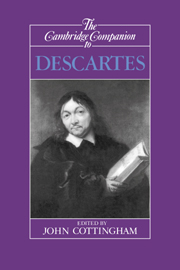Book contents
- Frontmatter
- Introduction
- 1 Descartes' life and the development of his philosophy
- 2 Descartes and scholasticism
- 3 The nature of abstract reasoning
- 4 Cartesian metaphysics and the role of the simple natures
- 5 The Cogito and its importance
- 6 The idea of God and the proofs of his existence
- 7 The Cartesian circle
- 8 Cartesian dualism
- 9 Descartes' philosophy of science and the scientific revolution
- 10 Descartes' physics
- 11 Descartes' physiology and its relation to his psychology
- 12 Descartes on thinking with the body
- 13 The reception of Descartes' philosophy
- Bibliography
- Index
9 - Descartes' philosophy of science and the scientific revolution
Published online by Cambridge University Press: 28 May 2006
- Frontmatter
- Introduction
- 1 Descartes' life and the development of his philosophy
- 2 Descartes and scholasticism
- 3 The nature of abstract reasoning
- 4 Cartesian metaphysics and the role of the simple natures
- 5 The Cogito and its importance
- 6 The idea of God and the proofs of his existence
- 7 The Cartesian circle
- 8 Cartesian dualism
- 9 Descartes' philosophy of science and the scientific revolution
- 10 Descartes' physics
- 11 Descartes' physiology and its relation to his psychology
- 12 Descartes on thinking with the body
- 13 The reception of Descartes' philosophy
- Bibliography
- Index
Summary
Descartes' concept of science can be understood only by paying careful attention to the historical context in which it was constructed. The scientific revolution of the seventeenth century involved two related developments: a change in scientific practice (or, more accurately, a whole series of such changes) which is reflected in the founding of new scientific societies such as the Royal Society and the Academie royale des sciences, and a complementary change in how natural philosophers described the kind of knowledge that resulted from the new scientific practices. Descartes contributed to both developments. He shared this distinction with such eminent figures as Galileo Galilei, Francis Bacon, William Harvey, Robert Boyle, Christian Huygens, and Isaac Newton, all of whom were concerned both with improving our knowledge of nature and with clarifying the status of that knowledge.
It would be an obvious oversimplification to classify all the natural philosophers of the seventeenth century as, in some fundamental sense, proposing the same scientific theories. It is equally unsatisfactory to suggest that they all accepted the same theory of science or the same model of scientific knowledge.
- Type
- Chapter
- Information
- The Cambridge Companion to Descartes , pp. 258 - 285Publisher: Cambridge University PressPrint publication year: 1992
- 18
- Cited by



